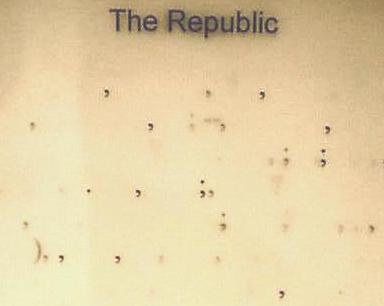Shadows of the Republic
made for Lexicon - Centre for Freudian Analysis
& Research

excerpt from catalogue text by Sharon
Kivland
TONY KEMPLEN - Shadows of the Republic, 1997
Kemplen has been working with exisitng texts and subjecting
them to various computer manipulations.
Here he has removed everything from the text of Plato's The
Republic, except for the punctuation and the spaces between
words.
This leaves a ghost text whose literal content can be
infinitely reconstructed.
Without the original text the reader has no access to any
method of decoding what was once there, indicated by the
absence of words whose trace still remains as a
space.
While it is still a book, it is a book that cannot be read
out loud, and its silent reading can be achieved only as a
mute scanning of its pages.
For Saint Augustine the spoken word was a part of the text
itself, letters were "invented so that we might be able to
converse even with the absent".
As a ghost, the text has left its mark, but the reader may
only express it as a pantomime of the intake and expulsion
of breath, in defined rhythms of the body (comma, space,
semi-colon, space, full stop).

lexicon
Neal Beggs - Susan Brind - Thomas A. Clark - Sonja Gangl
Tony Kemplen - Stephane Le Mercier - Catherine
Noury
The Centre for Freudian Analysis and Research (CFAR)
invites a discussion between artists and psychoanalysts
about the function of the work of art. lexicon is the
second exhibition to be held in CFAR's seminar rooms and
Rathbone Books. lexicon proposes that a text becomes an
image, and that in the forms of letters, words, and the
spaces between them some meaning can be established
(Susan Brind). lexicon proposes that it is a meaning that
escapes too ready an interpretation, that avoids the mere
substitution of one term for another (Neal Beggs), which
would conceal the image that first meets the eye and to
which one must be attentive, tracing out its form before
demanding its content (Sonja Gangl). In the framing of a
book shop, where certain credited forms of knowledge may
be bought and subsequendy aligned in another order
(Catherine Noury), texts circulate outside of the
confines of moveable objects with particular value
(Thomas A. Clark). The works in lexicon appear to demand
interpretation while simultaneously appearing to supply
one (Stephane Le Mercier), seemingly meeting the demand
of the viewer while equally frustrating it. lexicon will
be read in order to be able to read, retaining something
at the level of the image that is resistant to reading.
(Tony Kemplen). In seminar 2 Lacan warns of the dangers
of trying to understand, when one should instead simply
listen. Letter by letter, the viewer will of course
become a reader, silently mouthing where a finger might
outline instead. lexicon imagines a moment of waiting, in
which these works may be taken literally, a la lettre and
avant la lettre.



